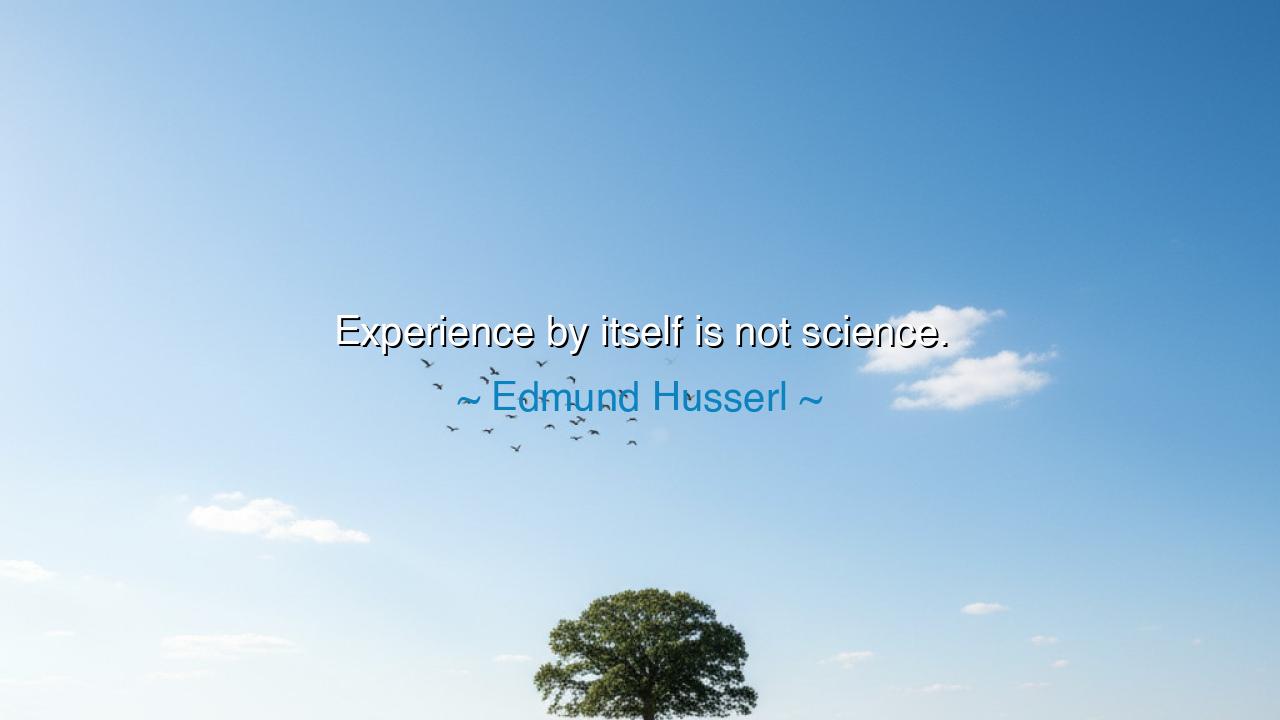
Experience by itself is not science.






Host: The soft murmur of the room was filled with a quiet sense of curiosity, as if a question was quietly waiting to be answered. Jeeny sat across from Jack, a book open in front of her, but her attention was on the thought that hung in the air. Jack glanced over at her, his expression thoughtful.
Jeeny: (carefully) “Edmund Husserl once said, ‘Experience by itself is not science.’”
Jack: (pausing to consider) “That’s a fascinating quote. It suggests that experience, by itself, isn’t enough to understand the world scientifically. There’s something more to it, something beyond just what we perceive or feel.”
Jeeny: “Exactly. It’s like Husserl is saying that while experience is important, it’s not enough to base our knowledge on. Science isn’t just about what we see or feel in the moment; it’s about understanding the deeper structures that underpin those experiences, and observing patterns that we might not notice right away.”
Jack: “Right. Experience is subjective — it’s personal, individual. But science, on the other hand, is about trying to objectively understand the world, to uncover universal truths that go beyond our own personal biases and interpretations.”
Host: The soft ticking of a clock in the background seemed to mark the rhythm of their thoughts. The conversation was no longer just about philosophy — it was about understanding the limits of our perception, and how science requires more than just the act of experiencing. It required analysis, reflection, and a deeper look at what those experiences mean.
Jeeny: “It’s interesting, though, because experience is where we start. Without experience, we wouldn’t have anything to analyze in the first place. It’s like the foundation of knowledge, but the scientific method takes that foundation and builds on it, organizing and systematizing what we know to create something more reliable, something we can generalize.”
Jack: (nodding) “Exactly. So experience is the beginning, but it’s just the raw material. What makes it science is reasoning, hypothesis testing, and observation in a systematic way. It’s about going beyond what’s immediately apparent, beyond the surface, to uncover something more substantial.”
Jeeny: “Yes, and I think that’s what makes science so powerful. It’s not just about what happens to us, but about looking at patterns, conducting experiments, and coming to conclusions that can be reproduced and verified by others. It’s not about subjective experience anymore; it’s about something objective.”
Host: The gentle rustle of the pages between them seemed to underscore their reflections. The idea that experience alone wasn’t enough to make something scientific opened the door to a larger conversation about how we approach knowledge and the world around us.
Jack: “In a way, experience gives us the data, but science is the process by which we interpret that data. Without that, we’d be left with a lot of fragmented information, unable to draw conclusions or build reliable systems of knowledge.”
Jeeny: “And that’s why experimentation is so important in science. It’s not enough to just experience something once; we need to observe it multiple times, control variables, and confirm that the results can be repeated. That’s how we turn experience into something scientifically valid.”
Jack: “So in a sense, Husserl is reminding us that while our experiences are valuable and fundamental to gaining knowledge, science requires more. It’s not just about perception; it’s about interpreting and refining that perception to arrive at a deeper understanding of the world.”
Host: The air in the room seemed to deepen, as if their thoughts had touched on something fundamental. Science, as they discussed, wasn’t just about what we experience firsthand. It was about moving beyond the immediate and creating systems of knowledge that were universally applicable, repeatable, and based on objective methods of inquiry.
Jeeny: “It’s almost like a process of distillation. Experience brings us raw material, but science takes that and distills it into something clear, systematic, and reliable. It helps us understand patterns, and that’s where knowledge grows.”
Jack: (smiling) “Exactly. It’s the difference between living through an event and then stepping back, reflecting on it, and analyzing it to understand why it happened or what it means. Without that reflection, we’re left with experience, but we’re not really building knowledge.”
Host: The soft rustle of papers in the room seemed to signal the end of their discussion, but the essence of it lingered. The idea that experience is foundational, yet not sufficient on its own, was a reminder of the complexity of knowledge — how we need both lived experience and the disciplined pursuit of understanding to move beyond the surface of things and reach deeper insights.
And as the scene faded, Edmund Husserl’s words lingered —
that experience alone cannot lead to science;
it is through observation, reasoning, and systematic inquiry
that we transform experience into knowledge,
and elevate our understanding of the world to something deeper,
more reliable, and more universal.
For science begins with experience,
but it doesn’t stop there —
it goes beyond the moment,
beyond perception,
to uncover the truths that shape our world.






AAdministratorAdministrator
Welcome, honored guests. Please leave a comment, we will respond soon